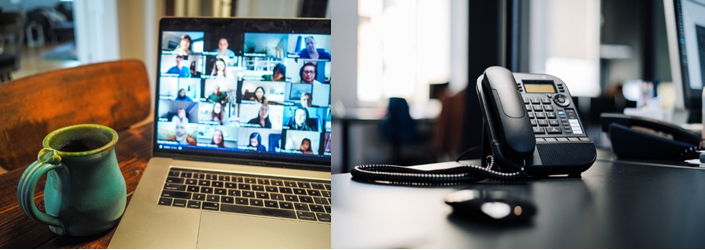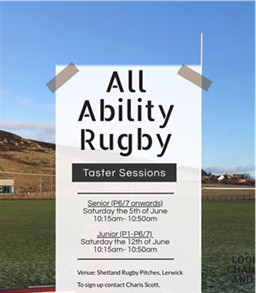Online group meetings, telephone and email conversations and an online survey were used to explore how the health and wellbeing of children and young people with neurodevelopmental differences in Shetland could be improved.
Before the pandemic Charis Scott, a Children’s Occupational Therapist working for NHS Shetland, received funding via the NES Allied Health Professionals Careers Fellowship to deliver a project. The project aimed to explore how the health and wellbeing of children and young people with neurodevelopmental differences in Shetland could be improved, using co-production. The Coalition for Personalised Care defines co-production as "a way of working that involves people who use health and care services, carers and communities in equal partnership; and which engages groups of people at the earliest stages of service design, development and evaluation".
Neurodevelopmental differences is an umbrella term which encompasses differences such as Autism Spectrum Disorders (ASD), Attention Deficit Hyperactivity Disorder (ADHD), Dyslexia, Developmental Coordination Disorder (DCD) and Tourette Syndrome, but the term is not limited to these differences alone.
What we did
Through delivering patient-centred care, Children’s Occupational Therapy staff are constantly engaging with children, young people and their families directly about their health care. It was clear from the many conversations that a lot of families were coming to the Children’s Occupational Therapy service with similar concerns around eating, sensory, sleep, behaviour that challenges, and toileting. Access to training had always been difficult prior to pandemic as it would often require people to attend training in person on the mainland. With only two forms of transport off Shetland (a flight or a 12-hour boat trip), as well as the additional cost of travel, training was not easily accessible. Families agreed that they would appreciate more training in the above areas.
Although Charis had spoken to families, it was only with the families who had a;ready engaged in the Children’s Occupational Therapy service. With help from Healthcare Improvement Scotland, the engagement stage of the project was redesigned to reach out to families and third sector colleagues across Shetland to understand what their needs were.
The views of children, young people, their families and the community were gathered through two engagement stages.
- 16 families shared their experiences in a variety of ways, including 2 virtual group meetings which took place during the first lockdown, as well as virtual one-to-ones, phone calls and emails. Participants were asked the following 5 questions to find out about the needs in Shetland and how these needs could be met:
- What diagnosis are you interested in?
- What currently works well in Shetland for your family?
- What do you think the needs are?
- What do you think the opportunities for improvements are?
- How might we achieve this improvement?

- Following the success of the first engagement activity, Charis worked with families to develop a public survey using information obtained from the virtual meetings. The public survey formed the second engagement stage and yielded an astonishing 142 responses from the wider Shetland community on how we could improve the health and wellbeing of children and young people with neurodevelopmental differences. The survey was made available online, with alternative formats made available on request. The link was widely distributed through local communication methods such as through third sector contacts, via NHS Shetland, Healthcare Improvement Scotland’s Community Engagement office in Shetland, local news channels and social media.
From all engagement activities, the following 4 priority areas were identified by participants:
- Training – practical support and training for everyone, especially families.
- Providing Information – around services, benefits, local support and charities during diagnosis process
- Public Awareness Raising – especially amongst children and young people within schools, in the community and sports and social clubs
- Neurodevelopmental Friendly Spaces – to encourage inclusivity amongst the community
Each of these were then taken forward and implemented:
- Online Training: Although training was something that families wanted, families were now partners in decisions regarding training and 6 online training sessions were delivered in partnership with Dyslexia Scotland, Tourette Scotland, Scottish Women’s Autism Network and NHS Fife.
- Information Pages: Charis liaised with different professionals and third sector organisations to gather information together on resources and support available to families, both locally and nationally.
- All Ability Rugby: In response to feedback, this project piloted All Ability rugby sessions which aimed to break down the barriers currently stopping some families engaging in sports, including sports sessions being too busy or even the demand in a session being too high. In partnership with Ability Shetland, Active School and Shetland Rugby Club, children and young people received sensory boxes funded by the project which contained social stories, a ball and other items to remove any barriers before attending the sessions. From May 2021 until June 2021, 5 rugby taster sessions were delivered in Shetland. Over 20 children and young people took part.

- Neurodevelopmental Friendly Spaces: As this project was conducted during the COVID-19 pandemic a lot of shops and businesses were not operating as usual. The original plan was to work alongside a local business or shop and support them to create a friendly space for children and young people with neurodevelopmental differences. Training would also be provided to staff if required. Many shops and business were contacted but due to the current global pandemic this work was not able to progress. However, both Sumburgh Airport and the Northlink ferries have already done work to support children, young people and adults with neurodevelopmental differences when they are accessing their services.
What worked well
Initially this project intended to use training to empower families and promote partnership working to achieve its aim. From a discussion with Shetland’s Engagement Officer for Healthcare Improvement Scotland, it quickly became clear that conversations had only taken place with the families who had engaged in the Children’s Occupational Therapy service. Charis was mindful that these conversations may have subconsciously directed families to come to the same conclusion that training was the way to meet this need. Redesigning the engagement stage of the project, with help from Healthcare Improvement Scotland, enabled Charis to reach out to families and third sector colleagues across Shetland to understand what their needs were.
When the pandemic happened, the initial project proposal was no longer viable as traditional face to face meetings to gather data was not feasible. Charis began by reaching out to families through social media and third sector colleagues across Shetland, encouraging families to get involved. Engaging families with the opportunity to engage using different formats including the online group meetings, offering telephone conversations meant that we were able to remove barriers such as childcare, travel cost and time constraints. Families commented in their evaluation forms that they felt they were able to share their experiences and make suggestions.
Using 5 very open-ended questions at the online group meetings and telephone conversations allowed families to discuss whatever they wanted. There was an initial worry that leaving the questions so open may lead to families identifying improvements beyond our project scope. However, the majority of responses consisted of areas of improvement that were not even thought of, and were simple solutions to issues that hadn’t even crossed Charis’ mind.
It is so easy as a professional to jump to conclusions but what felt like going back a step actually meant that the project really benefited the target audience. “It was amazing to think that in my haste to start my project I almost missed out on the most valuable resources available, which of course was the engagement with families.”
Although Charis’ initial thinking was right, that training was something that families wanted, families were now partners in decisions regarding training.
Here is some feedback received in relation to the changes that had been implemented:
“Lovely to have people giving the training who had experience both professionally and personally.” Online Training
“He loved interacting with everyone”. All Ability Rugby
“Wish I'd had the training sooner.” Online Training
“..absolutely loved the rugby sessions, it fits better with his needs and ability than usual clubs would.” All Ability Rugby
Through involving young people and families from the outset this project was able to expand beyond focusing on just training and support children and young people in ways that training could not. Creating an information page allowed people to share their knowledge of the support available to families locally and nationally instead of different people knowing small pockets of information and families having to seek this out. The All Ability Rugby group will continue beyond the project as it is encouraging inclusivity within sports and is providing support for coaches to have the confidence to meet the needs of children and young people with Neurodevelopmental Differences within their groups.
Throughout the project Charis maintained regular contact with families who engaged in the online discussions by providing them with regular updates on the project's progress as well as providing opportunities to have an input if they wanted to.
Challenges
Valuable time would have been saved if engaging in co-production happened right from the start, rather than trying to jump ahead based on the information gathered from having initial conversations with families who had only engaged in the Children's Occupational Therapy service.
The initial intention was to use Ketso, which is an interactive engagement tool that brings participants face-to-face. However, at the time there was no online Ketso approach to facilitate conversations around areas for improvement and solutions. This meant that the initial approach had to be adapted, which was effective, but had Ketso been able to be used, it was felt that the engagement sessions could have been structured more effectively.
As a Project Lead it was difficult not having a team to work with. To help overcome this, Charis quickly began liaising with key stakeholders, other professionals and third sector organisations. By recognising that everyone has different strengths and by creating these links, Charis started to make her own team of individuals with different skills and knowledge to support the project.
Contact
Name Charis Scott (Sports Development Co-ordinator, Ability Shetland)
Email: Charis.Scott3@shetland.org
Image credit: Charis Scott
